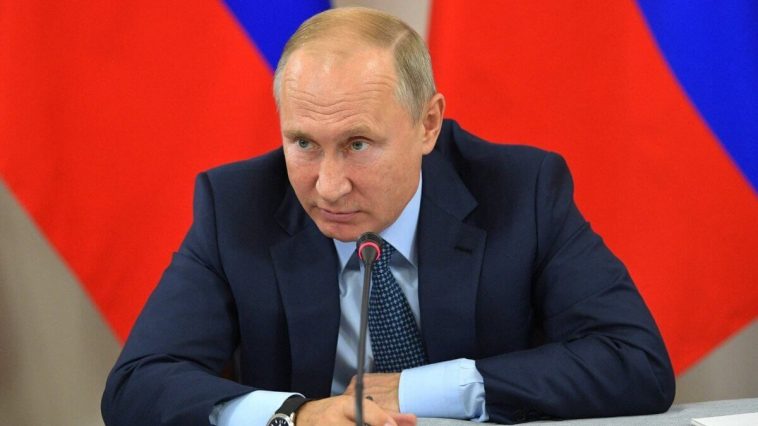Vladimir Putin has commissioned an article to National Interest on “The Real Lessons of the 75th Anniversary of World War II” which we briefly analyzed below.
- Russian President argues against rewriting of history, claiming that Western states “pursuing their goals,… increase the number and the scope of information attacks against our country, trying to make us provide excuses and feel guilty, and adopt thoroughly hypocritical and politically motivated declarations”. Kremlin, itself involved in ongoing disinformation campaigns throughout the world, has repeatedly refused to critically assess Soviet history and lessons of totalitarian past, choosing to whitewash it instead. Portraying the USSR as a vanquisher of Nazism and fascism (between which he does not differentiate), Putin fails to mention the more questionable acts of Red Army. Just in a single city of Berlin, approximately 100,000 women were raped and close to 10,000 died as a result. While Putin insists Russia welcomes open dialogue about the past, the parliament has passed a law, according to which anyone who “denigrates Russia’s record in World War Two could face fines and up to five years in prison” – which does not encourage open discussion.
- “In autumn 1939, the Soviet Union, pursuing its strategic military and defensive goals, started the process of the incorporation of Latvia, Lithuania and Estonia. Their accession to the USSR was implemented on a contractual basis, with the consent of the elected authorities. This was in line with international and state law of that time.” Putin promotes an exonerated image of the Soviet Union, denying what was widely recognized as Soviet occupation of Baltic states – the governments of which have repeatedly disagreed with Moscow’s assessment of “liberating” them. In Estonia alone, over 10,000 people, 7,000 of which were women, children and the elderly, were forcibly deported to Siberia in 1941.
- Moreover, Putin insists that “the Baltic republics within the USSR preserved their government bodies, language, and had representation in the higher state structures of the Soviet Union”, neglecting the Russia-centric cultural and social policy of the Soviet Union, which might have been inclusive on paper but was quite different in reality, denying the nations their true cultural and historic freedom to subdue them.
- “Poland, in pursuit of its interests, was doing its utmost to hamper the establishment of a collective security system in Europe” – Warsaw remains a target of a long-running campaign to portray the country as a hostile state with imperialist ambitions. What Putin does not talk about are at least 320,000 Polish prisoners of war that were deported, 150,000 Polish citizens who perished under Soviet rule during the war and NKVD killing 22,000 Polish military personnel and civilians in the Katyn massacre.
- While he seemingly acknowledges the negative impact of Molotov-Ribbentrop pact, Putin fails to mention the recent attempts of State Duma to revoke this decision. Moreover, he aims for international strife and diluting the blame: “we do not know if there were any secret “protocols” or annexes to agreements of a number of countries with the Nazis. The only thing that is left to do is to take their word for it.” Criticizing Hitler’s promotion of “disagreement and division” is ironic, given how many resources Kremlin has put in disinformation campaigns throughout the world aimed at precisely the same goal – to weaken and divide its adversaries from within.
- “What they shared was the love for their homeland, their Motherland. That deep-seated, intimate feeling is fully reflected in the very essence of our nation and became one of the decisive factors in its heroic, sacrificial fight against the Nazis” – while Russian nationals made an undeniable contribution to the Soviet victory, it still cannot be appropriated by Moscow. Belarus had close to 3 million victims, suffering the largest losses that constituted approximately 1/3 of its population. Ukraine has lost up to 10 million lives out of total 27 million victims.
- In celebrating the victory of USSR and commemorating the sacrifice of the Soviet soldiers, he neglects broader context. Repressive state apparatus and disregard for human life, broadly practiced by Soviet military commanders including decorated marshal Zhukov, led to many of these sacrifices that otherwise could have been avoided.
- “This shameful phenomenon manifested itself in all European countries. Such figures as Pétain, Quisling, Vlasov, Bandera, their henchmen and followers – though they were disguised as fighters for national independence or freedom from communism – are traitors and slaughterers” – judging collaboration with the Nazis, Putin all but avoids talking about the phenomenon in Russia, which far exceeded the figure of Vlasov, later focusing on “nationalists” in other former Soviet republics.
- Lamenting the alleged Western “deliberate policy aimed at destroying the post-war world order” is hardly genuine, coming from the architect of the first illegal redrawing of borders in Europe since WWII after annexation of Crimea in 2014.
All in all, Putin’s contribution does not bring anything new to the table – it is a distilled list of the historical narratives Kremlin has been promoting at home and abroad as a part of its propaganda campaign. Contributions like this at the very least deserve critical evaluation on behalf of the media that publish them, as they, in fact, do not constitute “a comprehensive assessment of the legacy of World War II”.

